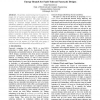Free Online Productivity Tools
i2Speak
i2Symbol
i2OCR
iTex2Img
iWeb2Print
iWeb2Shot
i2Type
iPdf2Split
iPdf2Merge
i2Bopomofo
i2Arabic
i2Style
i2Image
i2PDF
iLatex2Rtf
Sci2ools
DATE
2005
IEEE
2005
IEEE
Energy Bounds for Fault-Tolerant Nanoscale Designs
- The problem of determining lower bounds for the energy cost of a given nanoscale design is addressed via a complexity theory-based approach. This paper provides a theoretical framework that is able to assess the trade-offs existing in nanoscale designs between the amount of redundancy needed for a given level of resilience to errors and the associated energy cost. Circuit size, logic depth and error resilience are analyzed and brought together in a theoretical framework that can be seamlessly integrated with automated synthesis tools and can guide the design process of nanoscale systems comprised of failure prone devices. The impact of redundancy addition on the switching energy and its relationship with leakage energy is modeled in detail. Results show that 99% error resilience is possible for fault-tolerant designs, but at the expense of at least 40% more energy if individual gates fail independently with probability of 1%.
| Added | 24 Jun 2010 |
| Updated | 24 Jun 2010 |
| Type | Conference |
| Year | 2005 |
| Where | DATE |
| Authors | Diana Marculescu |
Comments (0)

